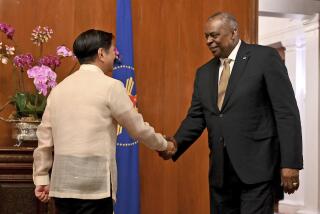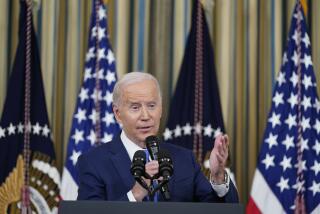Bush Presses Market Message in Singapore Visit : Southeast Asia: His thrust is to persuade American businesses to take advantage of the region’s opportunities.
- Share via
SINGAPORE — President Bush met today with Prime Minister Goh Chok Tang in a visit designed in large part to emphasize the importance of Southeast Asia as a market for U.S. industry.
Bush also announced, as expected, that the two governments had reached agreement to work toward a plan to move some U.S. naval operations to Singapore from Subic Bay in the Philippines by the end of the year.
In a joint news conference with Goh, Bush said the plan is “symbolic of our commitment to the region and the fact that we intend to stay as long as we are welcome.”
In a country whose free-trade policies give the United States no complaint, Bush’s economic message was directed less at Singapore than at American business in a reflection of Administration concern that the United States is being outflanked in the region.
Although the thrust of Bush’s coming visits to Korea and Japan will be in “persuading them to open markets,” one senior Bush adviser said, the priority in Southeast Asia is “persuading our people to take advantage of the opportunity.”
The value of U.S. exports to Singapore rocketed upward by 13% last year, and there were similar sharp gains in exports to Malaysia, Thailand and the Philippines in a boom the Administration holds up as a model of the success of open markets.
But Japan has taken the place of the United States as the region’s top trading partner. And the White House, anxious to fulfill Bush’s pledge to create more “jobs, jobs, jobs” through exports, is concerned that in export-hungry Southeast Asia, complacency could leave the United States outpaced.
Taking business leaders in tow as he met with Goh and other leaders, Bush later praised the Asian-Pacific region as an “economic dynamo” and an important target for U.S. economic growth.
“I think most American businessmen would say we’ve got to do better in trying to adapt to foreign markets,” he said at a joint news conference with Goh.
In interviews today, members of the business delegation accompanying Bush conceded that much of the problem is U.S.-based. “We have to educate business that there are opportunities here and it’s a very fertile market,” said Maurice R. Greenberg, chairman of the American International Group.
Bush arrived in Singapore Friday night after a seven-hour flight from Melbourne, Australia, and began his round of meetings in a ceremonial visit this morning to Istana Palace, where he reviewed white-clad troops wielding rifles with bayonets and visited with President Wee Kim Wee.
In a speech to the Singapore Lecture Group, Bush announced plans to forge a new partnership with Southeast Asians to use American equipment and technology to address “environmental challenges” in the region.
Such an arrangement, he said, would be “good for Asia’s environment and good for American jobs.”
Bush also formally declared that the United States will lift its 17-year-old trade embargo on Cambodia as part of a normalization of relations with what he called “that deeply wounded land.”
Apart from providing a new naval facility, the security arrangement with Singapore would also allow U.S. warplanes wider access to Singapore’s Paya Leba Air Base. A senior U.S. official described it as an important part of a “security network and fabric” taking shape in preparation for the shutdown by the end of the year of U.S. bases in the Philippines.
U.S. officials traveling with Bush aboard Air Force One on the flight here said that the Administration is also negotiating with Malaysia and Thailand for permission to transfer other naval operations to those countries from Subic Bay.
Nevertheless, Administration officials indicated that the overall U.S. presence would be far smaller than it has been, and they said the security environment in the Pacific had been radically changed by the collapse of the Soviet Union.
After years in which its vessels were an ever-present force, one senior official said, the Soviet navy is no longer conducting exercises in the region because there is too little fuel for the ships. “The whole thrust is toward pulling back,” the official said.
With his visit to Singapore, Bush became the first U.S. President to visit the prosperous city-state, which has been controlled since independence by the People’s Action Party, still headed by former Prime Minister Lee Kuan Yew.
In praising the attributes of Singapore as a U.S. market, one senior American official described the country as “a fascinating mix of Confucianism and democracy.” But while the elevation of Goh to power last year brought more openness to the once-autocratic state, Bush is still expected to raise human rights issues in his talks with the Singaporean leader.
In its last report on the issue, the State Department said there had been “credible reports of recent mistreatment” of dissidents in Singapore.
More to Read
Sign up for Essential California
The most important California stories and recommendations in your inbox every morning.
You may occasionally receive promotional content from the Los Angeles Times.













